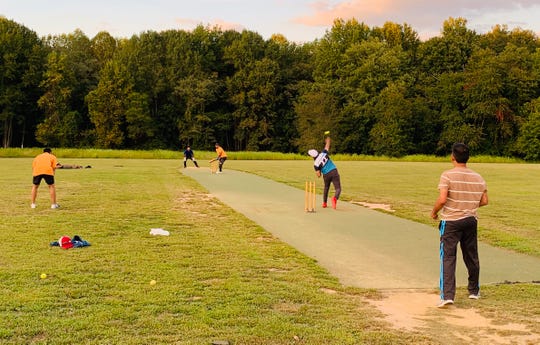On a summer weekend afternoon, Area 1 of Lums Pond State Park is in the throes of a ferocious cricket battle.
The grand climax of a match is at hand. In the right hand of the bowler at the north end is a ball; in the hands of the hunched batsman at the south end is a bat. And he is intently watching the bowler.
It might have been this batsman’s jutting backside that inspired Oscar Wilde to quip, “I never play cricket. It requires one to assume such indecent postures.”
The bowler starts to run as he delivers the last ball of the match. Suddenly there is pin-drop silence all around. Teams and their supporters become still — there isn’t even air moving through their noses.
The batsman’s mind is focused on scoring more than two runs off this ball. Only that will crown his team with a glorious victory, earning them a place in the coveted semifinals.
At least 100 cricket players visit Lums Pond every weekend during the season since two pitches were added in Area 3. It is time Delaware politicians took notice of the need and potential.
There are two cricket leagues at Lums Pond: The Delaware United Cricket League, which has been around for eight years, and the Delaware Premiere League, which is two years old. DUCL has 15 teams; DPL has 18.
DUCL’s season started in mid-April, and it held its semifinal matches last Saturday. On Sept. 21, at 11:30 a.m., the Lums Pond Cricket Club will face off against the Gujarat Lions in the semifinals. DPL’s season ended last weekend, when the Master Blasters defeated the Delaware Super Kings to claim the championship.
New cricket game formats are growing in popularity worldwide. The days of five-day-long test matches that often ended in a draw are long over.
Maybe George Bernard Shaw hastened their sunset when he said, “Baseball has the great advantage over cricket of being sooner ended.”
There’s a reason why cricket seems foreign to many Delawareans, says Paras Tiwari, captain of the DUCL’s defending champion team, the Lums Pond Cricket Club. The greater Philadelphia area has lost the passion for cricket that it had a century ago. These days, many think it is a game for minorities.
“All those who are playing here are those who were born, and also raised in most cases, in India, Pakistan, Bangladesh or Sri Lanka,” Tiwari says.
Cricket was introduced in that part of the world in the 1700s by the British. A distant cousin and forerunner of American baseball, it remains England’s national sport.
Some of Delaware’s cricket-crazy immigrants wish there was more local support in building interest in the sport.
“Why is cricket not introduced in schools?” asks Sunil Prashar, an all-round cricket veteran and DSK’s leading light. “Our own children — forget those who have no cricket in families — can’t learn the game without that.There is no academy in Delaware like in neighboring states. There is no indoor facility in Delaware like New Jersey has. That restricts the game to only a few months in a year.”
Major Minhas, who is one of DUCL’s main organizers, agreed that lack of facilities is a problem.
“We don’t have enough cricket pitches to play,” Minhas said. “One of the reasons why I supported Matt Meyer’s election was he promised one or more cricket pitches (cricket fields) in the county parks. But nothing so far.”
America has a closer history with cricket than you might think. Former President Ronald Reagan, who was “addicted” to cricket, thought it was “Buddhism made visible.” He was fond of using cricketing imagery and lingo.
“He also once said … that the most dangerous thing in the world, after Communism, was a rising ball outside the off-stump,” one former adviser was quoted as saying.
Cricket allowed Reagan to cozy up to Margaret Thatcher — unbeknownst to him, she knew a duck (zero in cricket) about cricket.
If you’re looking for something different, come and take in one of the cricket matches at Lums Pond. Perhaps you’ll even learn some of the sport’s terms that intrigued a former president: silly point, fine leg, short leg, slip, gully, googly, silly mid-on and silly mid-off, just to mention a few.
– – – – – – –
This column was published online by the www.delawareonline.com on September 19, 2019.
Also, published in Newspaper on September 21, 2019



Recent Comments